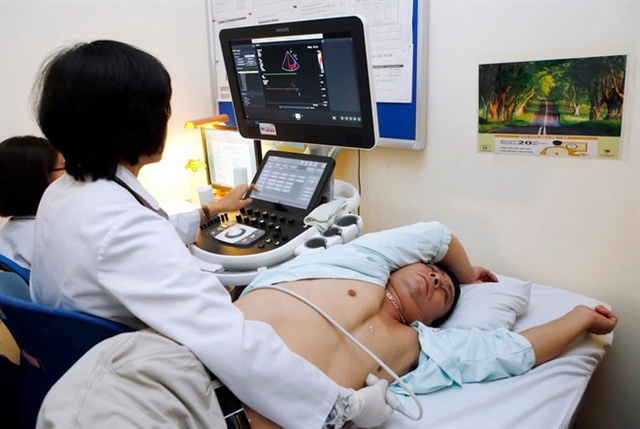 Society
Society


|
| A patient receiving a check-up at Hà Nội Heart Hospital. — VNA/VNS Photo |
HÀ NỘI — A national database will be developed on cardiovascular diseases to strengthen prevention, monitoring and treatment, according to Deputy Minister of Health Dr Nguyễn Tri Thức.
Thức said cardiovascular disease remains the country’s top killer, claiming around 200,000 lives each year, equivalent to more than 30 per cent of all deaths.
Cardiovascular conditions are becoming more complex and increasingly affect younger people, which makes prevention and treatment even more difficult, he said.
The database will connect patient records across provinces and cities, allowing hospitals at different levels to share information.
This means heart patients transferred to higher-level hospitals will not need to repeat unnecessary tests or imaging, saving both time and cost while helping doctors diagnose more effectively.
The system also ensures patients in remote or disadvantaged areas can benefit from the expertise of leading specialists through linked data.
The Ministry of Health will utilise the database to analyse disease patterns by region, enhance policy-making, and move towards personalised treatment. The project forms part of national efforts to apply science, technology and digital transformation in healthcare.
Over the past decade, Việt Nam’s medical sector has made significant advances in cardiovascular care, including clot-removal surgery for severe strokes, synchronised pacemaker implantation and radiofrequency ablation for arrhythmias. Early detection has also improved thanks to new imaging technologies.
Chợ Rẫy Hospital in HCM City, as the southern region’s leading referral centre, has pioneered many of these techniques, such as coronary interventions, treatment of congenital heart defects, and minimally invasive heart surgery.
Deputy Minister Thức called on the hospital to continue its role as a national leader, particularly by applying artificial intelligence to diagnosis and treatment, and contributing to the construction of the new database.
Network for laboratory testing
Separately, Bạch Mai Hospital in Hà Nội has established the country’s first Laboratory Institute by consolidating all its testing units into one.
The institute is fully automated, supported by robotics and AI, and provides results online. From 2026, it will also offer free basic screenings linked to electronic health records.
According to Associate Professor Dr. Đào Xuân Cơ, the institute is a crucial step towards nationwide connectivity in laboratory testing. Standardisation is the foundation for linking results between hospitals.
“Only when quality is consistent across units can data be truly shared,” he said.
Each day, major hospitals in Việt Nam conduct between 5,000 and 7,000 tests.
A connected network will reduce duplicate testing, lower treatment costs, and provide a clearer picture of disease trends, enabling the health sector to design more effective strategies. — VNS